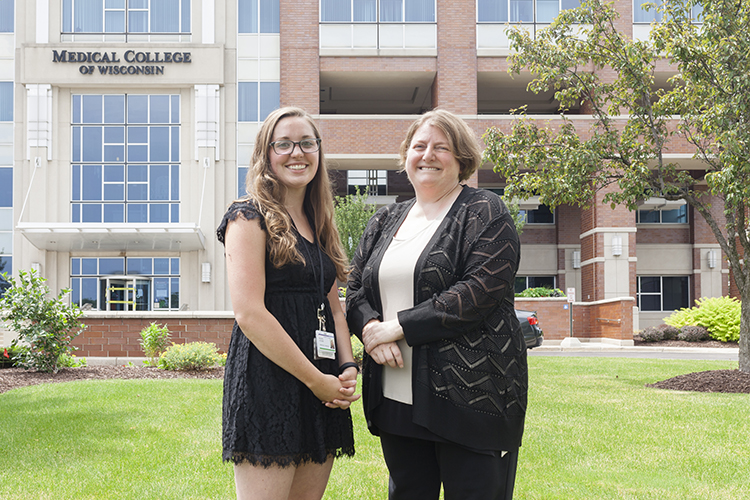It’s a sad fact that today too many people know somebody who’s been touched by opioid abuse.
“It’s one of those things now that’s common enough that when you bring it up, almost everybody knows somebody who has faced it,” said Rachel Lecher, a May 2017 graduate of UWM’s Joseph J. Zilber School of Public Health. “It always has been a problem, but I think the increase in overdose deaths is what’s really drawing attention to the problem.”
The problem is a growing one. In 2016, Milwaukee County recorded 294 deaths from opioid overdoses, up from 144 in 2013, according to the Medical Examiner’s Office. In one 72-hour period in June of last year, 12 probable overdoses were reported.
Lecher is helping fight the opioid problem as a research coordinator in emergency medicine at the Medical College of Wisconsin, a position she started right before graduation. She works with E. Brooke Lerner, professor of emergency medicine and pediatrics at the Medical College, who is leading numerous studies involving emergency department care and is deputy director of the Injury Research Center.
An opioid initiative, the Milwaukee Community Opioid Prevention Effort, was recently added to the center’s work as part of a collaborative effort sponsored jointly by the City of Milwaukee, the Medical College’s Department of Emergency Medicine and the Zilber Family Foundation.
While Lecher’s primary job is to coordinate research programs in emergency medicine, she has been able to use some of the expertise she developed through UWM to help out with the work on opioid prevention. One of her first projects at the Medical College was working to help create the Opioid Overdose Prevention Resources for the Milwaukee Community Opioid Prevention Effort website.
Lecher’s familiarity with opioid abuse grew out of one of her fieldwork experiences in the Zilber School at the North Shore Health Department. Ann Christiansen, North Shore health director/health officer, recognized an increase in opioid overdoses and asked Lecher to create a toolkit of information for parents, families and community members.
“Our staff is pretty limited so it was very helpful that Rachel took that project on and produced an excellent first draft,” Christiansen said.
The toolkit was finished by other members of the North Shore Health Department team and went online this spring.
As part of her research for the project, Lecher read through death records to get a feel for the real-life stories behind the epidemic.
“It’s very sad and emotional to hear people’s personal stories,” she said. Having a family member who’d had problems with opioid abuse and recovered gave her a special interest in the topic, Lecher said.
Lecher’s interest in public health grew out of her undergraduate major in human development and family studies at UW-Madison. “I was interested in community health, but I didn’t really know what public health was.”
After taking a public health course as part of a certificate in global health, she found her focus — “this was the happy medium combining the medical sphere and the community sphere,” she said.
Lecher was attracted to UWM’s public health program because of its proximity to her Brookfield home and the emphasis on addressing health disparities. She also liked the combination of academics and hands-on fieldwork. “I did two different internships at Children’s Hospital, and I got hired to work at the North Shore Health Department as a public health assistant.”
In that paid position she worked on a project analyzing data on children’s exposure to lead paint. In fact, Lecher’s path from capstone project to part-time position may become a model for future public health students in the North Shore Department, Christiansen said.
“The ability to gain connections was really amazing,” Lecher said of her Zilber experience. “Saying you were a graduate student in public health at UWM carried a lot of weight in the community. I was able to get some really cool opportunities.”








